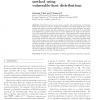Free Online Productivity Tools
i2Speak
i2Symbol
i2OCR
iTex2Img
iWeb2Print
iWeb2Shot
i2Type
iPdf2Split
iPdf2Merge
i2Bopomofo
i2Arabic
i2Style
i2Image
i2PDF
iLatex2Rtf
Sci2ools
IJSN
2007
2007
Optimal worm-scanning method using vulnerable-host distributions
: Most Internet worms use random scanning. The distribution of vulnerable hosts on the Internet, however, is highly non-uniform over the IP-address space. This implies that random scanning wastes many scans on invulnerable addresses, and more virulent scanning schemes may take advantage of the non-uniformity of a vulnerablehost distribution. Questions then arise as to how attackers may exploit such information and how virulent the resulting worm may be. These issues provide “worst-case scenarios” for defenders and “best-case scenarios” for attackers when the vulnerable-host distribution is available. This work develops such a scenario, called importance scanning, which results from importance sampling in statistics. Importance scanning scans the IP-address space according to an empirical distribution of vulnerable hosts. An analytical model is developed to relate the infection rate of worms with the importancescanning strategies. Based on parameters chosen from Witty and Code R...
Related Content
| Added | 15 Dec 2010 |
| Updated | 15 Dec 2010 |
| Type | Journal |
| Year | 2007 |
| Where | IJSN |
| Authors | Zesheng Chen, Chuanyi Ji |
Comments (0)

